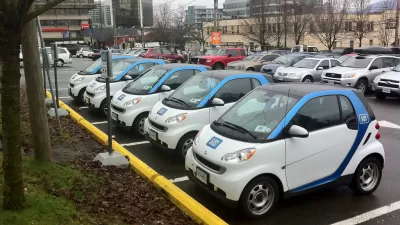Stephanie Steinberg and Bill Vlasic survey the growing universe of car-sharing services. From big corporations to non-profits, the high demand for car sharing in urban areas allows a variety of alternatives to "coexist comfortably."
With about two dozen car-sharing services currently operating in the United States, the growing rental universe is far from homogenous. From Smart cars fleets that charge customers by the minute and allow for one-way rentals and free street parking to industry stalwarts that offer numerous rental locations and a wide variety of automobiles, "rental providers are trying to differentiate themselves" to attract a share of the 800,000 people who belonged to car-sharing services in the United States last year, report Steinberg and Vlasic.
What explains the rise in car-sharing, and its many variants?
“There’s a trend in general for people wanting to pay for what they use,” said Car2go’s chief executive, Nicholas Cole. “It’s like the success in iTunes, where people choose to buy a few songs instead of the whole album.”
"The need for cheap, convenient mobility is fueling the growth of car sharing around the world, said Susan Shaheen, co-director of the Transportation Sustainability Research Center at the University of California, Berkeley. She said that recent statistics showed 1.7 million car-sharing members in 27 countries, not including so-called peer-to-peer services that allow drivers to rent vehicles directly from individual car owners."
"A menu of mobility options works for some consumers, like Michelle Fox, a 27-year-old executive of a technology company in Washington. Ms. Fox recently sold her Toyota S.U.V. because of the cost of car payments, insurance and parking."
"Instead, she uses a combination of Car2go, a bicycle-sharing network and the Uber call-a-limo service."
FULL STORY: Car-Sharing Services Grow, and Expand Options

Alabama: Trump Terminates Settlements for Black Communities Harmed By Raw Sewage
Trump deemed the landmark civil rights agreement “illegal DEI and environmental justice policy.”

Study: Maui’s Plan to Convert Vacation Rentals to Long-Term Housing Could Cause Nearly $1 Billion Economic Loss
The plan would reduce visitor accommodation by 25% resulting in 1,900 jobs lost.

Planetizen Federal Action Tracker
A weekly monitor of how Trump’s orders and actions are impacting planners and planning in America.

Waymo Gets Permission to Map SF’s Market Street
If allowed to operate on the traffic-restricted street, Waymo’s autonomous taxis would have a leg up over ride-hailing competitors — and counter the city’s efforts to grow bike and pedestrian on the thoroughfare.

Parklet Symposium Highlights the Success of Shared Spaces
Parklets got a boost during the Covid-19 pandemic, when the concept was translated to outdoor dining programs that offered restaurants a lifeline during the shutdown.

Federal Homelessness Agency Places Entire Staff on Leave
The U.S. Interagency Council on Homelessness is the only federal agency dedicated to preventing and ending homelessness.
Urban Design for Planners 1: Software Tools
This six-course series explores essential urban design concepts using open source software and equips planners with the tools they need to participate fully in the urban design process.
Planning for Universal Design
Learn the tools for implementing Universal Design in planning regulations.
Caltrans
Smith Gee Studio
Institute for Housing and Urban Development Studies (IHS)
City of Grandview
Harvard GSD Executive Education
Toledo-Lucas County Plan Commissions
Salt Lake City
NYU Wagner Graduate School of Public Service



























